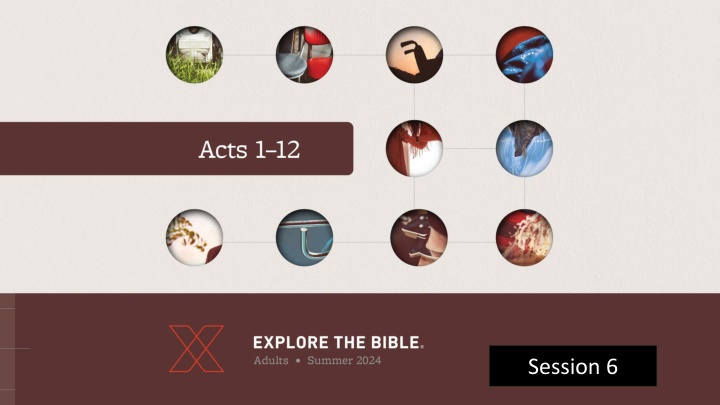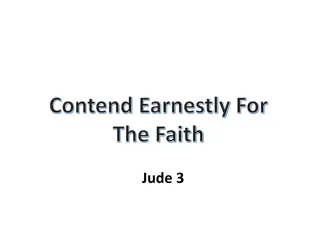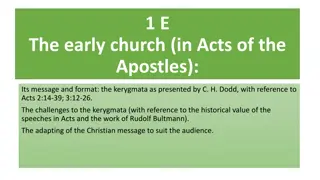Accountability depicted in Acts - Barnabas, Ananias, and Sapphira
Explore the theme of accountability in the biblical accounts of Barnabas, Ananias, and Sapphira from the book of Acts. Delve into the consequences of their actions and how believers are held accountable for their motives in service.
Download Presentation

Please find below an Image/Link to download the presentation.
The content on the website is provided AS IS for your information and personal use only. It may not be sold, licensed, or shared on other websites without obtaining consent from the author.If you encounter any issues during the download, it is possible that the publisher has removed the file from their server.
You are allowed to download the files provided on this website for personal or commercial use, subject to the condition that they are used lawfully. All files are the property of their respective owners.
The content on the website is provided AS IS for your information and personal use only. It may not be sold, licensed, or shared on other websites without obtaining consent from the author.
E N D
Presentation Transcript
Accountable Accountable (Acts 4:36 (Acts 4:36- -5:11) 5:11)
MAIN IDEA: MAIN IDEA: God holds believers accountable for God holds believers accountable for their motives in service. their motives in service.
Introduction Accountable How have you experienced accountability? How does accountability impact how you view a responsibility assigned to you?
Accountable I. II. Exhibit B: Ananias (Acts 5:1-6) III. Exhibit C: Sapphira (Acts 5:7-11) Exhibit A: Barnabas (Acts 4:36-37)
Exhibit A: Barnabas (Acts 4:36-37) 36Joseph, a Levite from Cyprus, whom the apostles called Barnabas (which means son of encouragement ),37sold a field he owned and brought the money and put it at the apostles feet.
Exhibit A: Barnabas (Acts 4:36-37) Believers can encourage others by meeting the needs of others. How was Barnabas an encourager to others? How can our giving be a means of encouragement to others? In what ways can you participate in the benevolence ministry of our church?
Exhibit B: Ananias (Acts 5:1-6) Now a man named Ananias, together with his wife Sapphira, also sold a piece of property.2With his wife s full knowledge he kept back part of the money for himself, but brought the rest and put it at the apostles feet. 3Then Peter said, Ananias, how is it that Satan has so filled your heart that you have lied to the Holy Spirit and have kept for yourself some of the money you received for the land?4Didn t it belong to you before it was sold? And after it was sold, wasn t the money at your disposal? What made you think of doing such a thing? You have not lied just to human beings but to God. 5When Ananias heard this, he fell down and died. And great fear seized all who heard what had happened.6Then some young men came forward, wrapped up his body, and carried him out and buried him.
Exhibit B: Ananias (Acts 5:1-6) Believers must carefully examine their motives when giving. Why might a person persistently be dishonest with God? What are some of the consequences people face because of their dishonest charity?
Exhibit C: Sapphira (Acts 5:7-11) 7About three hours later his wife came in, not knowing what had happened.8Peter asked her, Tell me, is this the price you and Ananias got for the land? Yes, she said, that is the price. 9Peter said to her, How could you conspire to test the Spirit of the Lord? Listen! The feet of the men who buried your husband are at the door, and they will carry you out also. 10At that moment she fell down at his feet and died. Then the young men came in and, finding her dead, carried her out and buried her beside her husband.11Great fear seized the whole church and all who heard about these events.
Exhibit C: Sapphira (Acts 5:7-11) Believers must guard against following others poor examples. Why is it so important to be careful about who we allow to influence us? How do you determine the choices you make? How do you evaluate the choices you made?
CHALLENGE Do you have a sense of joy in your giving or is giving one more duty to check off? How can you escape cheerless giving? What conversations do you need to have with God, yourself, and your family members about giving?























